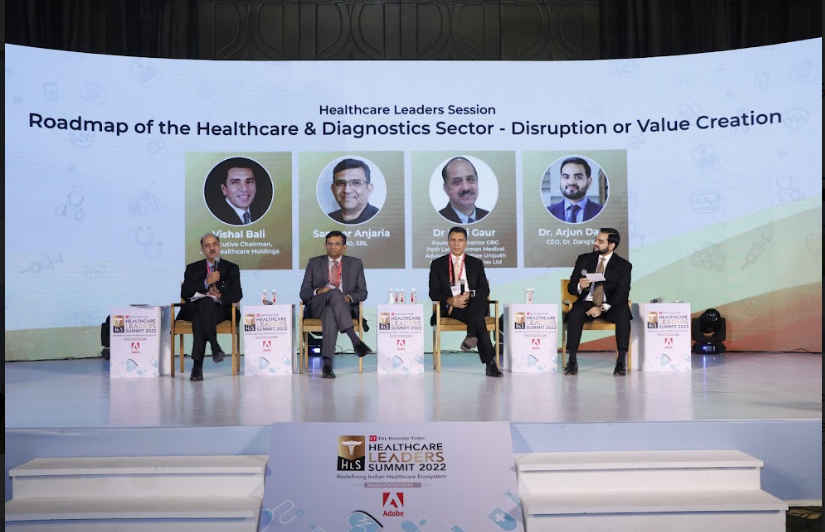[ad_1]

New Delhi: The diagnostics industry has undergone immense pressure due to the COVID-19 pandemic which has led both diagnostic developers and manufacturers to meet patient-centric demands. In the second edition of the Economic Times Healthcare Leaders Summit 2022 organised by ETHealthworld, the stalwarts from the diagnostics industry discussed and deliberated on the path of evolution to revolution in the field, the role of technology and the future prospects of diagnostics.
The panel discussion on ‘Roadmap of the Healthcare and Diagnostics Sector – Disruption or Value Creation’ deliberated on the vital role of technology in diagnostics and how the sector is evolving. The panellists for this session included Vishal Bali, Executive Chairman, Asia Healthcare Holdings; Sameer Anjaria, COO, SRL; Dr Ravi Gaur, Founder & Director, DRG Path Lab and Chairman, Medical Advisory Committee Unipath Specialty Laboratories Ltd. The moderator for the session was Dr Arjun Dang, CEO, Dr Dang’s Lab.
Calling the diagnostics industry the epitome of an example of VUCA (volatility, uncertainty, complexity, and ambiguity) world, Dr Dang started the discussion by posing a question to Bali on his views on integrated healthcare and the role of speciality health providers’ benefit from it. Bali informed that “One of the biggest drivers of change in the healthcare sector is the power of the consumer and that seems to be rising more and more with every year. The rise of integrated healthcare worldwide and here, at the centre of that is how we actually provide healthcare services to our consumers end to end.”
According to him, there is a lifetime value seen around consumers in healthcare and across consumer-centric sectors. Today technology and integrated healthcare allow us to engage with consumers over a long period of time and this relevance is now becoming more dominant. “The future rides on the intersection of both the multi-specialty hospital chains and the single-specialty hospital chain, but in between all of this, the integrated flow of diagnostics and other services will continue to be the real future of healthcare”, he added.
Dr Dang agreed to it and added “Patient centricity is the core of integrating any healthcare service. With the patient at the centre and its impact to the patient, it is crucial for us to understand and define an integrated healthcare ecosystem.”
Speaking on healthcare being commoditised, Dr Gaur shared, “Healthcare is a necessity, a need, but there needs to be a balance. Cost is an important factor in healthcare. It has to be brought down by the market itself. On the other hand, the government is trying to put brakes on many other things. I think we have to work together on whether to bring down the costing, policy, and equality.”
In agreement with Dr Gaur, Dr Dang highlighted that, “Post pandemic, patients do understand what the value of a correct report is. And at the end of the day, it’s that report that’s going to guide the majority of the decisions that doctors make, so it’s anything but a commodity.”
Elucidating on the role of technology in the diagnostics industry, especially AI, Anjaria said “Technology is here to stay. In the diagnostics space, access for sure is approving. We have 5G knocking at our doors. There are enough examples of use cases of robotic surgery or distinct surgery which are already being piloted at this particular point in time. And as and when that technology also stabilises, becomes more mainstream, that is when accessibility goes up. Over time, affordability will also go up.”
Anjaria added that “The bedrock of the healthcare industry is trust. Technology is only the bridge between patient and doctor or medical service provider.” The element of trust has implications on patient centricity. Diagnostics labs are put through a series of sensitisation programmes because ‘it’s not a sample, it’s a human’.
Dr Dang discussed the global healthcare market and key takeaways for India. Answering him, Bali shared clinical research and innovation is one area where India needs to make progress. He added that “The west learnt very early that healthcare needs to learn from other sectors.” The healthcare sector needs a tremendous amount of professional input for the opportunities and challenges to move forward. Another challenge are the health insurance companies which are only discussing the pricing and not innovating around healthcare models.
The diagnostic industry has seen newer labs over the months and the word quality has been used extensively. Informing on the new players, Dr Gaur said “As a diagnostic provider, we need to create disruption which is of value to the patients. Diagnostics going forward has to be personalised, not generalised. Scaling may not be better all the time. For healthcare, it is better to have a quality personalised service.” Dr Dang agreed that USP should be a QSP of quality, service and personalised care.
Commenting on the healthcare infrastructure built during the Covid pandemic which now lies vacant, Anjaria said, “It was required. The tremendous pressure on providing reports on time necessitated this infrastructure. These facilities have now penetrated into town tier which was earlier not there. It is important for the industry to find new use cases for the infrastructure present.”
Dr Dang concluded the panel discussion with focus on staying updated in the diagnostics industry while keeping patient-centricity at the centre. “If pathology has to succeed, it has to be patient-centric,” he said.
[ad_2]
Source link
